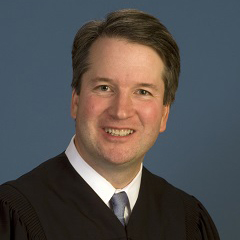83 ethics complaints against Justice Kavanaugh tossed for lack of jurisdiction

Supreme Court Justice Brett M. Kavanaugh.
Citing a lack of jurisdiction, a judicial council in Denver has dismissed 83 misconduct complaints made by the public against U.S. Supreme Court Justice Brett M. Kavanaugh.
The allegations are serious, but the federal law governing misconduct complaints against federal judges does not apply to justices on the U.S. Supreme Court, according to the order released Tuesday by the Judicial Council of the 10th U.S. Court of Appeals at Denver. The National Law Journal has coverage.
Many of the complaints allege that Kavanaugh made false statements under oath during hearings on his nominations to the U.S. Court of Appeals for the D.C. Circuit in 2004 and 2006 and to the U.S. Supreme Court this year. Other complaints accuse Kavanaugh of making inappropriate partisan statements, or claim he treated members of the Senate Judiciary Committee with disrespect.
Kavanaugh was renominated to the D.C. Circuit in 2006 after there was no action on the first nomination.
The complainants include lawyers, doctors, professors and concerned citizens, according to a footnote. The council said it “greatly liberalized” its standards for accepting complaints, even accepting postcards as long as the complainant is identified.
Some of the complainants saw bias in Kavanaugh’s spirited denial of allegations that he sexually assaulted Christine Blasey Ford when they were students in high school. Kavanaugh had complained of “an orchestrated political hit” and said some Democrats had been “lying in wait” with Ford’s allegation.
Other complaints concern prior confirmation hearing statements by Kavanaugh about Guantanamo detainees and hacked emails.
Democratic Sen. Dick Durbin of Illinois has contended that Kavanaugh misled him during the 2006 confirmation hearing when he denied involvement in questions about the rules for the detention and interrogation of Guantanamo detainees. A Washington Post article said Kavanaugh did participate in a 2002 meeting when he was asked how he thought Justice Anthony M. Kennedy would vote on an issue regarding the detainees.
Some also raised doubts about Kavanaugh’s statements that he was unaware of hacked Democratic emails when he helped prepare judicial nominees as a lawyer for the George W. Bush administration.
Chief Justice John G. Roberts Jr. had referred complaints against Kavanaugh to the 10th Circuit in October, just days after Kavanaugh’s confirmation to the Supreme Court.
The judicial council order, signed by 10th Circuit Chief Judge Tim Tymkovich, said the Kavanaugh complaints were governed the Judicial Conduct and Disability Act. The law gives the judiciary the authority to investigate judicial misconduct complaints but only for federal judges below the Supreme Court level.
“Because it lacks jurisdiction to do so, the council makes no findings on the merits of the complaints,” Tymkovich’s order said.
Tymkovich also acknowledged a need to ensure that “governing bodies with clear jurisdiction are aware of the complaints.”
“Accordingly,” he wrote, “we request that the committee on Judicial Conduct and Disability of the Judicial Conference of the United States forward a copy of this order to any relevant congressional committees for their information.”



